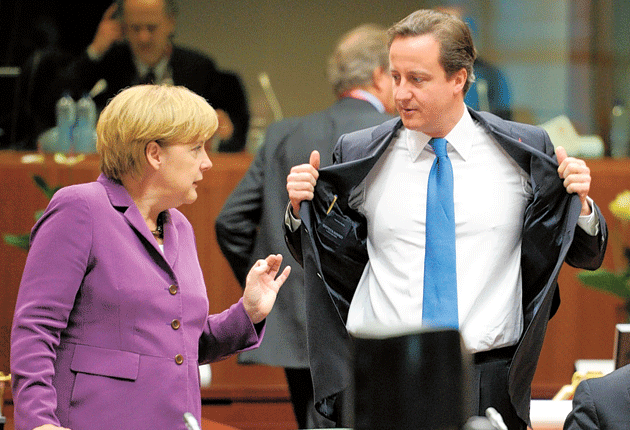Britain claims victory over EU budget rises

Your support helps us to tell the story
From reproductive rights to climate change to Big Tech, The Independent is on the ground when the story is developing. Whether it's investigating the financials of Elon Musk's pro-Trump PAC or producing our latest documentary, 'The A Word', which shines a light on the American women fighting for reproductive rights, we know how important it is to parse out the facts from the messaging.
At such a critical moment in US history, we need reporters on the ground. Your donation allows us to keep sending journalists to speak to both sides of the story.
The Independent is trusted by Americans across the entire political spectrum. And unlike many other quality news outlets, we choose not to lock Americans out of our reporting and analysis with paywalls. We believe quality journalism should be available to everyone, paid for by those who can afford it.
Your support makes all the difference.David Cameron yesterday claimed to have achieved a "spectacular success" over European spending, despite accepting that Britain would have to hand over £430m more to Brussels next year.
Twelve other countries, including Germany and France, backed his demand to limit any increase in the European Union budget to 2.9 per cent. The European Parliament and the European Commission want a rise of 6 per cent. Mr Cameron announced he had also won support from other European leaders for future EU spending to be linked to the cuts being made by member states.
Last week the Prime Minister said he wanted the EU budget for 2011 to be frozen or even cut. But yesterday he argued that pegging the rise to 2.9 per cent "made a real difference" and that the 6 per cent plan was now "dead".
He said: "Just as at home we inherited finances that were a complete mess, so too in Brussels we have inherited a budget deal completely out of touch with the situation we face across Europe. I believe that as a result of Britain's intervention the spotlight has now shifted to reining in the excesses of the EU budget."
However, a protracted wrangle over Brussels spending lies ahead, as MEPs and the commission are likely to press for a higher increase. Yvette Cooper, the shadow Foreign Secretary, said: "David Cameron's grandstanding has been a complete failure. He has tried to swing his handbag, but simply ended up clobbering himself in the face."
His deal is also likely to find little favour with Conservative Eurosceptics, who opposed any increase in funding for Brussels. The Prime Minister is attempting to allay their anger over the 2011 deal by arguing that he is focusing on a bigger prize – a squeeze on the EU's 2014-20 budget.
At the summit, the EU also supported a Franco-German plan to alter the Lisbon Treaty to help to shore up Europe's defences against any new financial crises. Mr Cameron had made his support dependent on agreement to keep the EU budget in check.
Despite loud opposition at the start of the week, EU leaders finally fell into line during a night of talks. They said they all backed the reforms as they would help to prevent a repeat of the Greek debt crisis. The President of the EU Council, Herman van Rompuy, described the deal as a "solid pact to strengthen the euro. That's one of the most important decisions that we have taken in the last months".
The two-day summit in Brussels was a triumph for the German Chancellor Angela Merkel, who led the crusade to impose tougher rules on the 16 eurozone countries. Under ferocious attack domestically for her handling of the eurozone crisis earlier this year, Ms Merkel was under pressure to succeed in Brussels. German taxpayers had to pay for the lion's share of a ¤440trn bailout fund for Greece in May, fuelling demands for a shake-up of the EU's budget and debt rules.
"It's always the case that not everyone agrees at the start," she responded to remarks that she was being dubbed the new Iron Lady. "We all represent different European interests. I know [others] thought we could have had this crisis mechanism without treaty change. But I had another view."
Join our commenting forum
Join thought-provoking conversations, follow other Independent readers and see their replies
Comments